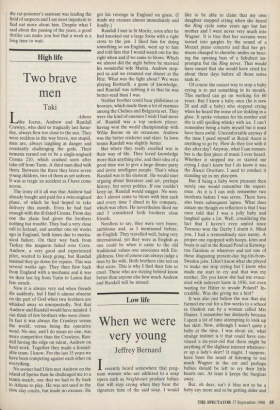High life
Two brave men
Taki
ike Icarus, Andrew and Randall Crawley, who died so tragically last Satur- day, always flew too close to the sun. They were reckless in the way brave, not stupid, men are, always laughing at danger and constantly challenging the gods. Their nemesis turned out to be a single-engined Cessna 210, which crashed soon after take-off from Turin. A third man died with them. Between the three they leave seven young children, two of them as yet unborn. It was as tragic an accident as I have come across.
The irony of it all was that Andrew had already bought and paid for a twin-engined plane, of which he had hoped to take delivery this month. Even he had had enough with the ill-fated Cessna. From day one the plane had given the brothers nothing but trouble. They had a very close call in Iceland, and another one six weeks ago in England, both times due to mecha- nical failure. On their way back from Turkey the magneto failed over Crete. Andrew, a very good and experienced pilot, wanted to keep going, but Randall insisted they go down for repairs. This was several weeks ago. They then flew back from England with a mechanic and it was on their last leg from Turin to Luton that fate struck.
Now it is always very sad when friends die suddenly, but I find it almost obscene on the part of God when two brothers are whisked away so unexpectedly. Not that Andrew and Randall would have minded. I can think of few brothers who were closer. In fact it was always the Crawleys versus the world, versus being the operative word. No one, and I do mean no one, was more competitive than the Crawleys, Ran- dall having the edge on talent, Andrew on hard work. Together they made a formid- able team. I know. For the last 15 years we have been competing against each other on everything.
No sooner had I first met Andrew on the island of Spetse than he challenged me to a tennis match, one that we had to fly back to Athens to play. He was not used to the slow clay courts, but made no excuses. He got his revenge in England on grass. (I made my excuses almost immediately and loudly.) Randall I met in St Moritz, soon after he had knocked out a large Swiss with a right cross to the jaw. I liked him for doing something so un-English, went up to him and told him that I would watch out for the right when and if we came to blows. Which we almost did the night before he married his wonderful wife Marita. Andrew stop- ped us and we resumed our dinner at the Ritz. What was the fight about? We were playing Botticelli, a game of knowledge, and Randall was rubbing it in that he was better-read than I was.
Neither brother could bear philistines or hoorays, which made them a lot of enemies among the Chelsea and Belgravia set. They were the kind of enemies I wish I had more of. Randall was a top rackets player, having won the world championship with Willie Boone on six occasions. Andrew was the better cricketer and skier. In lawn tennis Randall was slightly better.
But where they really excelled was in their way of life. They loved knowledge more than anything else, and their idea of a good time was to give a large dinner party and invite intelligent people. That's when Randall was in his element. He would start arguing about literature and art, perhaps history, but never politics. If one couldn't keep up, Randall would snigger. No won- der I almost came to blows with him each and every time I dined in his company, which was often. He nevertheless liked me and I considered both brothers close friends.
Needless to say, they were very brave, ambitious and, as I mentioned before, un-English. They travelled well, being very international, yet they were as English as one could be when it came to the old traditional values one associates with En- glishness. One of course can always judge a man by his wife. Both brothers rate ten on that score. This is why I find their fate so cruel. Those who are staying behind know better than anyone else how much Andrew and Randall will be missed.


































































 Previous page
Previous page